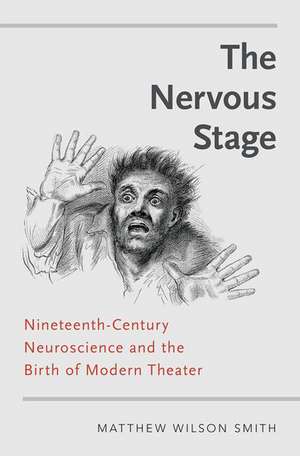The Nervous Stage: Nineteenth-century Neuroscience and the Birth of Modern Theatre
Autor Matthew Wilson Smithen Limba Engleză Hardback – 16 noi 2017
Preț: 317.60 lei
Preț vechi: 387.45 lei
-18% Nou
Puncte Express: 476
Preț estimativ în valută:
60.77€ • 63.45$ • 50.30£
60.77€ • 63.45$ • 50.30£
Carte tipărită la comandă
Livrare economică 25-31 martie
Preluare comenzi: 021 569.72.76
Specificații
ISBN-13: 9780190644086
ISBN-10: 0190644087
Pagini: 238
Dimensiuni: 239 x 157 x 25 mm
Greutate: 0.48 kg
Editura: Oxford University Press
Colecția OUP USA
Locul publicării:New York, United States
ISBN-10: 0190644087
Pagini: 238
Dimensiuni: 239 x 157 x 25 mm
Greutate: 0.48 kg
Editura: Oxford University Press
Colecția OUP USA
Locul publicării:New York, United States
Recenzii
The book's nuanced and profound exploration of how emerging neurophysiological ideas intertwined with performance both onstage and off makes this text essential reading to anyone interested in the medicalized subject or in the effect of neuroscience uponthe cultural history of Western Europe.
Smith's deep readings successfully portray what he sets out to show: the neural turn, one might call it, where nerves are seen as intrinsically theatrical and quintessentially modern. Exploring questions of agency and subjectivity, his book on theatre's centrality for interdisciplinary reflection features the theatre as nervous and nerves as theatrical (in the truest sense of the Greek theasthai: 'to behold'). The author's narrow neural focus as applied to a broad spectrum of materials is enlightening for interdisciplinary readers, and particularly intriguing for those interested in modern comparative literature and theatre studies.
This is a highly recommendable book, which will pique the interest not only of an eager band of nineteenth-century historians of science, but also of scholars throughout the humanities.
Drawing especially on Nicholas Daly, Joseph Roach, Rae Beth Gordon, Stanton B. Garner, Jr., and Alan Richardson, Matthew Wilson Smith traces a trajectory through acting, melodrama, opera, naturalism, expressionism, and Artaudian theatre to argue that the nineteenth- century "theatre of sensation" [...] served as a template for modern performance. In The Nervous Stage, Smith uses six horizontal case studies to sketch an impressionistic narrative, offering some quite brilliant exegeses of his texts. The focus on depth over breadth means that Smith presents a theorization of what makes theatre modern, rather than a vertical history of modernist theatre [...] [A] significant contribution.
... given the prominence of the figures and theories discussed, Wilson Smith undeniably delivers what he sets out to do: a novel reading of theatre that stands in close relation to developments in the study of neuroscience. For me, he also offers a conception of neuroscience refreshed by its influence on us being not only via direct therapeutic innovations, but by complex, subtle and pervasive influences on our self-conception.
... this brilliant study is destined to become a standard in the field. ... Summing Up: Highly recommended. Graduate students, researchers, faculty.
Smith's deep readings successfully portray what he sets out to show: the neural turn, one might call it, where nerves are seen as intrinsically theatrical and quintessentially modern. Exploring questions of agency and subjectivity, his book on theatre's centrality for interdisciplinary reflection features the theatre as nervous and nerves as theatrical (in the truest sense of the Greek theasthai: 'to behold'). The author's narrow neural focus as applied to a broad spectrum of materials is enlightening for interdisciplinary readers, and particularly intriguing for those interested in modern comparative literature and theatre studies.
This is a highly recommendable book, which will pique the interest not only of an eager band of nineteenth-century historians of science, but also of scholars throughout the humanities.
Drawing especially on Nicholas Daly, Joseph Roach, Rae Beth Gordon, Stanton B. Garner, Jr., and Alan Richardson, Matthew Wilson Smith traces a trajectory through acting, melodrama, opera, naturalism, expressionism, and Artaudian theatre to argue that the nineteenth- century "theatre of sensation" [...] served as a template for modern performance. In The Nervous Stage, Smith uses six horizontal case studies to sketch an impressionistic narrative, offering some quite brilliant exegeses of his texts. The focus on depth over breadth means that Smith presents a theorization of what makes theatre modern, rather than a vertical history of modernist theatre [...] [A] significant contribution.
... given the prominence of the figures and theories discussed, Wilson Smith undeniably delivers what he sets out to do: a novel reading of theatre that stands in close relation to developments in the study of neuroscience. For me, he also offers a conception of neuroscience refreshed by its influence on us being not only via direct therapeutic innovations, but by complex, subtle and pervasive influences on our self-conception.
... this brilliant study is destined to become a standard in the field. ... Summing Up: Highly recommended. Graduate students, researchers, faculty.
Notă biografică
Matthew Wilson Smith is Associate Professor of German Studies and Theater & Performance Studies at Stanford University. He is the author of The Total Work of Art: From Bayreuth to Cyberspace (Routledge, 2007) and the editor of Georg Büchner: The Major Works (Norton, 2011)
